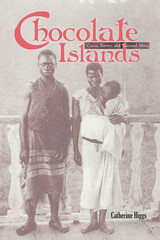
In Chocolate Islands: Cocoa, Slavery, and Colonial Africa, Catherine Higgs traces the early-twentieth-century journey of the Englishman Joseph Burtt to the Portuguese colony of São Tomé and Príncipe—the chocolate islands—through Angola and Mozambique, and finally to British Southern Africa. Burtt had been hired by the chocolate firm Cadbury Brothers Limited to determine if the cocoa it was buying from the islands had been harvested by slave laborers forcibly recruited from Angola, an allegation that became one of the grand scandals of the early colonial era. Burtt spent six months on São Tomé and Príncipe and a year in Angola. His five-month march across Angola in 1906 took him from innocence and credulity to outrage and activism and ultimately helped change labor recruiting practices in colonial Africa.
This beautifully written and engaging travel narrative draws on collections in Portugal, the United Kingdom, and Africa to explore British and Portuguese attitudes toward work, slavery, race, and imperialism. In a story still familiar a century after Burtt’s sojourn, Chocolate Islands reveals the idealism, naivety, and racism that shaped attitudes toward Africa, even among those who sought to improve the conditions of its workers.

Charles Schwab was known to his employees, business associates, and competitors as a congenial and charismatic person-a 'born salesman.' Yet Schwab was much more than a salesman-he was a captain of industry, a man who streamlined and economized the production of steel and ran the largest steelmaking conglomerate in the world. A self-made man, he became one of the wealthiest Americans during the Gilded Age, only to die penniless in 1939.
Schwab began his career as a stake driver at Andrew Carnegie's Edgar Thomson steel works in Pittsburgh at the age of seventeen. By thirty-five, he was president of Carnegie Steel. In 1901, he helped form the U.S. Steel Corporation, a company that produced well over half the nation's iron and steel. In 1904, Schwab left U.S. Steel to head Bethlehem Steel, which after twelve years under his leadership, became the second-largest steel producer in America. President Woodrow Wilson called on Schwab to head the Emergency Fleet Corporation to produce merchant ships for the transport of troops and materials abroad during World War I.
Kenneth Warren presents a compelling biography that chronicles the startling success of Schwab's business career, his leadership abilities, and his drive to advance steel-making technology and operations. Through extensive research and use of previously unpublished archival documentation, Warren offers a new perspective on the life of a monumental figure--a true visionary--in the industrial history of America.

Business genius and hedonist, Charles Schwab entered the steel industry as an unskilled laborer and within twenty years advanced to the presidency of Carnegie Steel. He later became the first president of U.S. Steel and then founder of Bethlehem Steel. His was one of the most spectacular and curious success stories in an era of great industrial giants.
How did Schwab progress from day laborer to titan of industry? Why did Andrew Carnegie and J.P. Morgan select him to manage their multmillion-dollar enterprises? And how did he forfeit their confidence and lose the preseidency of U.S. Steel? Drawing upon previously undiscovered sources, Robert Hessen answers these questions in the first biography of Schwab.

A unique and important study, Stepping Forward examines the experiences of nineteenth- and twentieth-century black women in Africa and African diaspora communities from a variety of perspectives in a number of different settings.
This wide-ranging collection designed for classroom use explores the broad themes that have shaped black women’s goals, options, and responses: religion, education, political activism, migration, and cultural transformation. Essays by leading scholars in the field examine the lives of black women in the United States and the Caribbean Basin; in the white settler societies of Kenya, Zimbabwe, and South Africa; and in the black settler societies of Liberia and Sierra Leone.
Among the contributors to this volume are historians, political scientists, and scholars of literature, music, and law. What emerges from their work is an image of black women’s agency, self-reliance, and resiliency. Despite cultural differences and geographical variations, black women have provided foundations on which black communities have not only survived, but also thrived. Stepping Forward is a valuable addition to our understanding of women’s roles in these diverse communities.
READERS
Browse our collection.
PUBLISHERS
See BiblioVault's publisher services.
STUDENT SERVICES
Files for college accessibility offices.
UChicago Accessibility Resources
home | accessibility | search | about | contact us
BiblioVault ® 2001 - 2024
The University of Chicago Press









